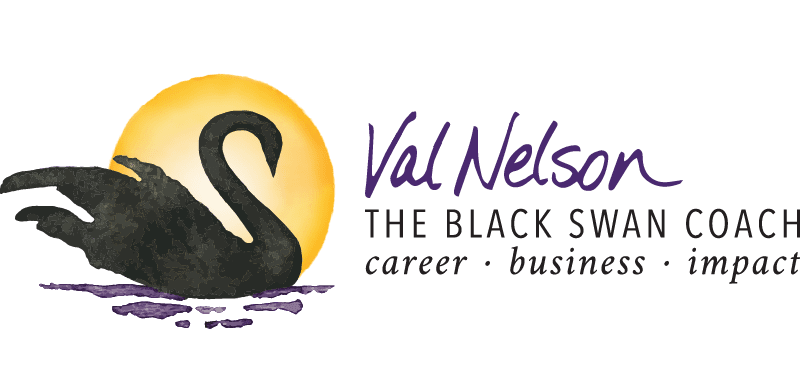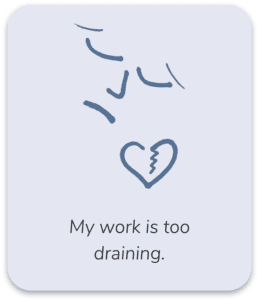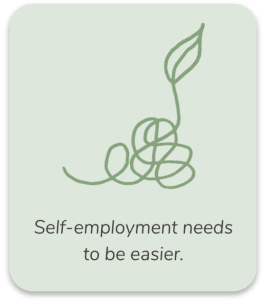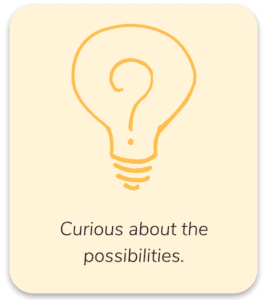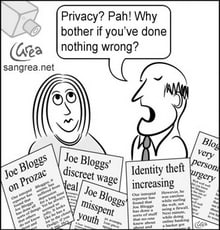 Email is not private. Think of email like a postcard, at best. It’s actually more public than a postcard. Here’s what you need to know.
Email is not private. Think of email like a postcard, at best. It’s actually more public than a postcard. Here’s what you need to know.
It’s a common concern for identity theft, things you wouldn’t want a future employer to know, mental health comments that can be used against you like in a car accident lawsuit, and things like that.
This post outlines the privacy issue and some solutions for privacy and email.
In a nutshell, here’s why email is not private:
- It’s relatively easy to see any email message if someone cares enough to hunt for it, and hackers do care enough to look.
- There are some common incidental ways that people end up seeing your email.
Anyone Can Track Down My Emails?
A postcard is only exposed to the mail carriers and whoever sees your mail where you live or work. That’s nothing compared to the fact that anyone in the world can track down your email messages if they want to.
I don’t know the technical details on how to snoop, but from what I understand, enough people have that technical know-how and there’s nothing (but scruples) to stop them from using it. And if you watch those criminal investigation TV shows, you’ve seen it in action.
Even worse than that, snoopers can often find past emails, even after you have deleted them. Your email provider might store copies that go way back.
Think no one cares enough to snoop?
Think again. Consider that you might end up in a lawsuit over a car accident, and the opposition will want to find a little dirt on you to discredit you. Email is an easy place to look for “dirt” like a message to a friend that you’re depressed. They can use that against you. How sad.
More Common Privacy Mishaps
OK, let’s assume you’re not the subject of a police investigation, lawsuit, or snooping, there are still some common ways that people see your emails:
- Emails are notoriously forwarded without the sender’s permission. Whether in the name of efficiency or gossip, it’s common.
(“Look what this person just said about you!”) - We accidentally send an email to the wrong person.
(I have two friends named Meg and I accidentally wrote to the wrong Meg the other day. Luckily it wasn’t a breech of confidence but it was definitely confusing.) - We accidentally hit “reply all” when we meant to write to only one person.
(Ouch, I still remember a time someone hit “reply all” when she wrote something very personal to me. I don’t know who was more embarrassed: me, her, or the fifty or so recipients.) - And then there’s your work email that can be viewed by your employer anytime.
Are you still using work email for personal emailing? Time to use your own email account.
Solution?
Basically, don’t say it over email if you don’t want it on the news or mentioned in a court room.
Remember the phone? Hey, there it is next to the computer. So convenient. Haha.
Phone calls are much more private. Phone privacy is protected by law in the U.S. And honestly, it’s more suitable for delicate conversations anyway.
What About Encrypted Email?
There are ways to send encrypted email for greater privacy, but it’s a bit of a hassle. Last I checked, it hasn’t made it into common usage. But if you need it enough to go to some trouble and probably pay a bit, it’s available.
When I interact with my clients via the internet, I have a secure client portal where all messages are secure.
By law (HIPAA), health care providers in the U.S. are supposed to (or at least strongly encouraged to) use encrypted communication or similar privacy protection methods when discussing patient info electronically. In reality, providers are not 100% compliant.
Note that when you use an email service like Gmail, they offer a secure server to view your messages online, but this does not protect your email from being seen. The emails are not encrypted during sending and receiving.
Don’t confuse email’s lack of privacy with concerns about banking online or using credit cards online. There are numerous encryption and privacy methods in place on legitimate banking and e-commerce websites. Yes they are sometimes hacked but that’s for another day.
Side note:
Cybersecurity is a growing field and could be a good easy-to-learn option for introverts who like behind-the-scenes work. Check out my list of Best Careers for Introverts, HSPs, and Other Sensitive Souls.
